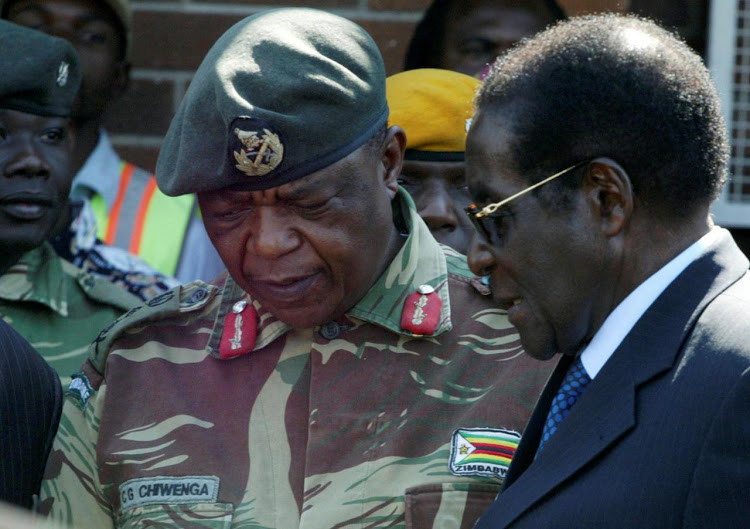PBS: Escaping Eritrea … [Read More...] about ካብ ውሽጢ ቤት ማእሰርታት ኤርትራ
Meet the force behind Zimbabwe’s ‘Crocodile’ president
Ed Cropley | 01 January 2018 | Business Day
Intelligence report says General Constantino Chiwenga is now the most feared man in government and party as well as the whole country

HARARE — His wife is a beauty queen, his troops unseated Zimbabwean leader Robert Mugabe, and his motorcade is fit for a president. General Constantino Chiwenga, head of the armed forces until earlier this month, is on a roll.
On December 15 his 10-vehicle convoy, complete with soldiers toting AK-47 assault rifles, roared into a congress of the ruling Zanu-PF party. It was one of several displays of power by Zimbabwe’s generals since they helped oust Mugabe, the southern African nation’s ruler of 37 years, on November 21.
Ostensibly Chiwenga, 61, is subordinate to the veteran politician who replaced Mugabe as president: Emmerson Mnangagwa, nicknamed the Crocodile. Mnangagwa, 75, was sworn in on November 24 and promised to hold elections in 2018.
But since Mugabe was deposed and Mnangagwa installed, moves by senior military men have suggested the president is the junior partner in an army-dominated administration. Following a month of speculation about his role in Mnangagwa’s government, Chiwenga was named vice president on December 23. He was also appointed defence minister on December 29, so retaining control of the military.
That perception of Mnangagwa’s disempowerment is buttressed by reports seen by Reuters from inside Zimbabwe’s Central Intelligence Organisation (CIO). “The generals have tasted power and they are not willing to let it go,” reads one intelligence report, dated November 29. “They want to enjoy the fruits of removing Mugabe from power.” Another report, from November 22, described the backroom negotiations to form a post-Mugabe government. “Chiwenga is the one going to have final say as power is in his hands. He is now the most feared man in government and party as well as the whole country,” it said.
The documents reviewed by Reuters are the latest installments in a series of hundreds of intelligence reports the news agency has seen from inside the CIO dating back to 2009.
Reuters has not been able to determine their intended audience, but the documents cover every aspect of Zimbabwean political life over the last eight years — Mugabe, the top echelons of his Zanu-PF party, the military, opposition parties and the white business community.
In the dying days of Mugabe’s regime, the CIO – the principal organ of Mugabe’s police state – split into two factions. One served the interests of Mnangagwa, the other those of his main political rival, Grace Mugabe, the president’s 52-year-old wife, according to several Zimbabwean intelligence sources.
Much of the content of the CIO reports has turned out to be correct, including an intelligence finding reported by Reuters in September that the army was backing then vice-president Mnangagwa to take over from Mugabe.
Army spokesman Overson Mugwisi did not respond to requests for comment on behalf of Chiwenga. However, a senior general appointed to Mnangagwa’s post-Mugabe cabinet, Air Force chief Perrance Shiri, said there was nothing wrong in having military men in government.
“Who says military people should never be politicians?” he told reporters at a lunch to celebrate the cabinet’s inauguration on December 4. “I am a Zimbabwean. I’ve got every right to participate in the country’s politics.” Mnangagwa did not reply to an interview request for this article and his spokesman, George Charamba, did not respond to a request for comment. Mnangagwa’s lawyer, Edwin Manikai, said the president wanted to “work with anybody who adds value to the economy,” in line with the new leader’s stated desire to halt Zimbabwe’s precipitous economic decline under Mugabe.
‘Democratic correction’
Mugabe’s removal started with soldiers entering Harare on November 14 and announcing in the early hours of November 15 that they had taken control. Military vehicles took to the streets and gunfire and explosions were heard in parts of the capital. “It is not a military takeover of government,” said General Sibusiso Moyo, reading a statement on TV.
The generals dubbed their project “Operation Restore Legacy.” They called the move a “democratic correction” against a 93-year-old leader whose decisions, they alleged, were being manipulated by an ambitious wife half his age. Reuters was unable to contact Grace Mugabe for comment.
Since his appointment, Mnangagwa has promised to rebuild relations with the West, to protect foreign investors and to hold elections.
“I intend, nay, am required, to serve our country as the president of all citizens, regardless of colour, creed, religion, tribe or political affiliation,” he said after being sworn in. The voice of the people was the “voice of God.” But for many Zimbabweans, actions speak louder than words.
On December 4, Mnangagwa appointed Shiri, the Air Force chief, to the post of minister of agriculture. Moyo, the general who had announced the military’s intervention, became foreign minister.
“Mnangagwa has got the reins but he cannot operate outside the generals that put him in office,” said Martin Rupiya, a Zimbabwean professor at the University of South Africa (Unisa) in Pretoria and an expert on the Zimbabwe military.
